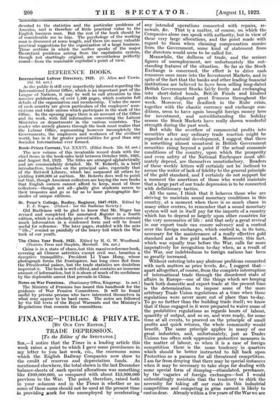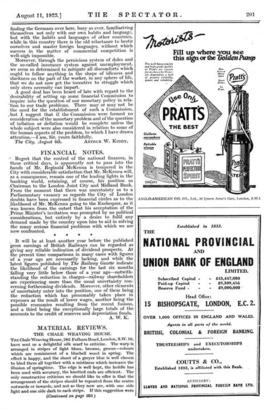FINANCE-PUBLIC & PRIVATE.
[By OUR CITY EDITOR.]
TRADE DEPRESSION.
- [To the Editor of the SPECTATOR.] SIR,—I notice that the Times in a leading article this week raises a point to which I gave some prominence in my letter to you last week, viz., the enormous sums which the English Railway Companies now show to the credit of reserves and depreciation funds. As mentioned elsewhere, the total shown in the last December balance-sheets of such special allocations was something like £109,000,000, as compared with about £15,000,000 previous to the War. The point, therefore, raised both in your oolumns and in the Times is whether or no some of these sums should not be used at the present time in providing work for the unemployed by accelerating any intended operations connected with repairs, re- newals, &c. That is a matter, of course, on which the Companies alone can speak with authority, but in view of these very large allocations, and the point made with regard to them when claiming compensation monies from the Government, some kind of statement from the directors would seem to be called for.
Meanwhile, the dullness of trade, and the serious figures of unemployment, are unfortunately the out- standing features of the situation. So far as the Stock Exchange is concerned, the effect is to drive cash resources once more into the Investment Markets, and in spite of the fact that the banks and other leading financial institutions are believed to have been selling long-dated British Government Stocks fai.,ly freely and exchanging into short-dated bonds, British Funds and kindred stocks have displayed great firmness throughout the week. Moreover, the deadlock in the Ruhr crisis, together with the chaotic currency and exchange con- ditions, seem to have again brought foreign money here for investment, and notwithstanding the holiday season the Stock Markets have really shown wonderful strength during the past week. But while the overflow of commercial profits into securities after any ordinary trade reaction might be regarded as a natural development, I suggest that there is something almost unnatural in British Government securities rising beyond a point if the actual economic conditions of the country, upon which the prosperity and even safety of the National Exchequer must ulti- mately depend, are themselves unsatisfactory. Readers of these weekly letters will certainly not be inclined to accuse the writer of lack of fidelity to the general principle of the gold standard, and I certainly do not support for a moment the assertions of those who would maintain that a large part of our trade depression is to be connected with deflationary tactics.
All the same, I think that it behoves those who are striving to maintain sound monetary conditions in this country, at a moment when there is so much chaos in many other centres, to remember that a sound monetary system will not in itself pay far the imports of a country which has to depend so largely upon other countries for the very necessaries of life : and that only a great revival in our export trade can ensure solvency and a control over the foreign exchanges, which control is, in its turn, necessary for the maintenance of a really effective gold standard and a free gold market. Moreover, this fact, which was equally true before the War, calls far more imperatively for recognition to-day when, as a result of the War, our indebtedness to foreign nations has been so greatly increased.
Without entering into any abstruse problems connected with such matters as price levels, &c., I suggest that— apart altogether, of course, from the complete interruption of international trade through the disordered state of affairs in Europe—one of the things which are keeping back both domestic and export trade at the present time is the determination to impose some of the more arbitrary Trade Union regulations at a time when those regulations were never more out of place than to-day. To go no farther than the building trade itself; we know that if those engaged in it were prepared to waive some of the prohibitive regulations as regards hours of labour, quantity of output, and so on, and were ready, for some time at all events, to proceed on the principle of small profits and quick returns, the whole community would benefit. The same principle applies in many of our great industries, and, unfortunately, just as Trades Unions too often seek oppressive protective measures in the matter of labour, so when it is a case of foreign competition there .is the same tendency in quarters which should be better instructed to fall back upon Protection as a panacea for all threatened competition. I am far from denying that there may be special instances when it may be necessary to take steps for dealing with some special form of dumping—stimulated, perchance, by the vagaries of foreign exchanges—but I would unhesitatingly maintain that the tendency to shirk the necessity for taking off our coats in this industrial competition and competing in grim earnest is likely to cost us dear. Already within a few years of the War we are finding the Germans over here, busy as ever, familiarizing themselves not only with our own habits and language, but with the habits and languages of other countries, while in this country there is the old reluctance to bestir ourselves and master foreign languages, without which success in the matter of commercial competition is well-nigh impossible. Moreover, through the pernicious system of doles and the so-called insurance system against unemployment, we seem so determined to mitigate all discomforts which ought to follow anything in the shape of idleness and 'slackness on the part of the worker, in any sphere of life, that we do not now get the incentive to struggle which only stern necessity can impart. A good deal has been heard of late with regard to the 'desirability of setting up some financial Commission to inquire into the question of our monetary policy in rela- tion to our trade problems. There may or may not be the need for the establishment of such a Commission, but I suggest that if the Commission were formed no consideration of the monetary problem and of the question of inflation or deflation would be complete unless the whole subject were also considered in relation to some of the human aspects of the problem, to which I have drawn attention.—I am, Sir, yours faithfully,



































 Previous page
Previous page